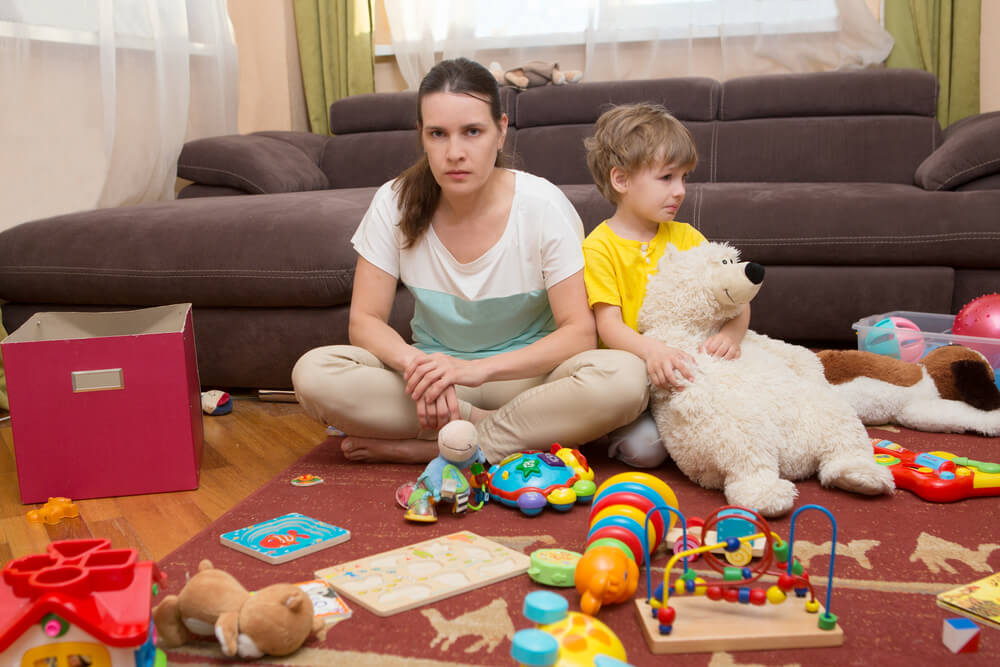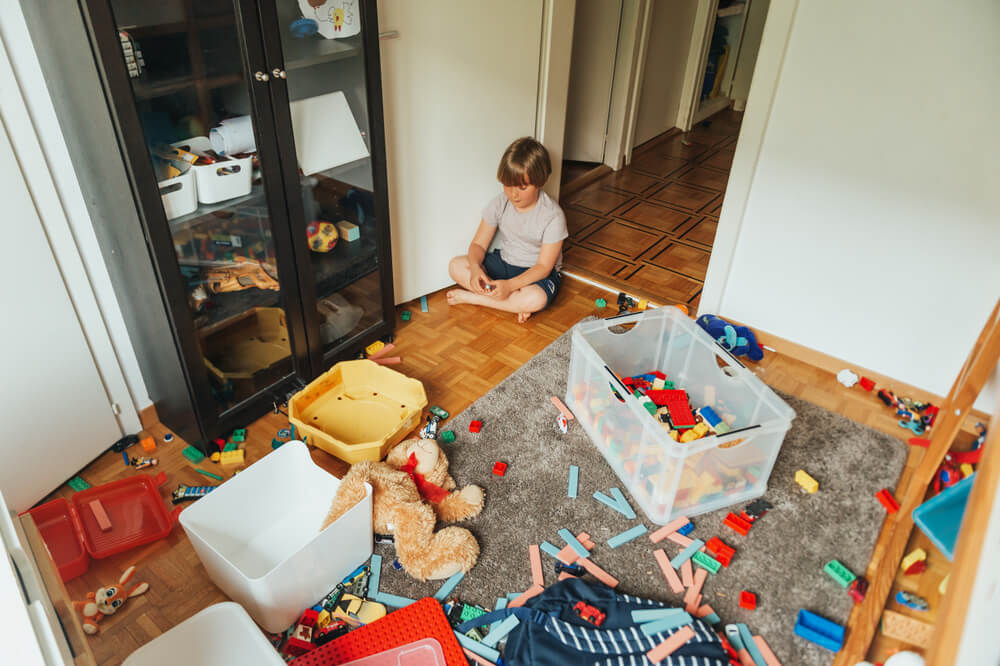Plenty of children have messy rooms, and often it’s because they’re focused on other “more fun” activities. However, sometimes, a messy room can be a subtle sign of child depression. Unfortunately, statistics reveal that around 20% of all teenagers experience depression before adulthood, and up to 15% suffer from depression at any time.
To bring awareness to this sombering topic, we’ve decided to explain the connection between child depression and a messy room. Furthermore, if all signs point to this mental disorder, we’ve also included helpful tips for worried parents. Besides younger children, we’ll try to answer “how does depression affect teens” and other frequently asked questions.
If this sounds interesting to you, keep on scrolling for the rest.
What’s the Difference Between a “Depression Room” and Laziness?

There are heaps of reasons why your child may have a messy room. For example, maybe they’re preoccupied with a new hobby, or perhaps they have too much stuff, and they’re unsure where to put things away. Some parents may also believe that their child is outright lazy. But, when is a kid’s messy room a sign of something more serious, such as depression?
Here are some well-known symptoms of depression you should look out for:
- Social withdrawal
- Low energy and/or fatigue
- Continuous feelings of hopelessness and sadness
- Anger or crankiness
- Changes in appetite levels (decreased or increased)
- Changes in sleep (excessive sleep or not enough sleep)
- Crying and/or outbursts
- Headaches, stomachaches, or other physical complaints
- Feelings of guilt
- Overall low self-esteem
- Loss of focus
- Thoughts of suicide/death
On the flip side, when your child is just being lazy, they typically do not display the child depression symptoms mentioned above. That being said, before diagnosing your child with a mental illness, we recommend you consult a highly-trained professional. For instance, if you’re in the area or looking for reliable experts, a depression therapist in Miami is a fantastic idea.
You’ll also want to have a sincere conversation with your child about mental health. However, don’t be pushy if your child refuses to open up to you. If you continue to force a conversation, your child may withdraw even more.
How is a Messy Room and Depression Linked?
If you’re wondering how the two are linked, here are a few bullet points to bring the topic to light:
- Depressed children withdraw socially. So, they’re spending more time indoors, leading to a so-called “depression room.”
- Depressed children lack the energy to clean their rooms. They may also feel unmotivated.
- Children with depression may feel like there’s no point in putting in the effort to keep their rooms organised and neat.
- Children with constant physical aches may feel like a messy room is not prioritised.
- Lack of focus can make it hard for children to tidy their rooms.
- A depressed child with an eating disorder may hoard snacks in their room, leading to messiness.
As you can see, there is a clear link between a messy room and depression that commonly gets mistaken for laziness or having a lack of time. What’s even worse is that a messy room can increase feelings of depression and anxiety. It’s no secret that a clean environment can positively affect our mental well-being.
So, when it comes to a messy room and depression, it’s similar to a never ending loop. Depression may cause clutter to pile up, which further increases depression and anxiety symptoms.
Fortunately, there are many ways you can help your child today.
How Can I Help My Child?
Now that you’ve identified the signs that your child has a mental illness, it’s time to do something about it. Above all, we recommend seeking out professional help.
There are several ways you can deal with child depression. Here are the top five ways:
Take them to a professional
As mentioned, you’ll want to get expert advice. Depression is a severe mental illness that can result in brutal consequences, including suicide when left untreated. The expert will give you further guidance and the best solution to approach the issue. You may also want to reach out to a local mental health service or look online for helpful resources.
Most importantly, don’t leave child depression untreated.
Provide your child with emotional support
Your child needs your love and guidance. You need to be their biggest cheerleader when it comes to overcoming depression. One of the most significant factors in overcoming child depression is parental (or guardian) love. This means that we recommend you to:
- Listen to your child and hear what they have to say.
- Encourage honesty in all conversations.
- Acknowledge their feelings and their side of the story.
- Spend quality time with them.
As we’ve mentioned, a kid’s messy room may be a sign that your child feels unloved. They may feel as if nothing in this world matters. If you care for your child, tell them you love them and prove that your words are sincere.
Help them connect with peers (and with you)
A depressed child is often isolated and lonely. What’s even worse is that a depressed child who withdraws from social interaction will experience a lack of connection, further worsening the symptoms of the mental illness. Of course, parents can’t make their children have friends. However, they can encourage them to:
- Join clubs and go to activities they enjoy.
- Connect with other family members at gatherings.
- Attend fun social events.
- Go to sleepovers and playdates (you can organise them at your house if your child would feel more comfortable).
Remember, whatever helps your child feel connected to their surroundings, do it. However, don’t force things if they don’t want to participate in activities. Instead, approach them gently.
Encourage them to live healthier

Mental health and physical health are connected. Namely, a healthy lifestyle can help alleviate symptoms of mental conditions like depression and anxiety. So, you can encourage your child to:
- Eat more nutritious meals full of vitamins and minerals
- Exercise frequently (either promote a particular sport, dance activity, yoga, swimming, or at least daily walks)
- Get uninterrupted sleep each night
Again, don’t force things when it comes to food and exercise. Some children are picky eaters. You can slowly incorporate nuts, healthy grains, vegetables, fruits, and lean meats into their diet, day by day when it comes to food.
As for exercise, make sure to encourage them to move their body in a way that feels good to them. Physical exercise can be anything from taking a brisk walk around the park to dancing to loud music.
Book Your Appointment Now
Child depression may lead to severe consequences if left unattended. So, make sure to consult with reliable professionals and get your child’s mind back on track. Take care of those dearest to you and book your appointment today.




